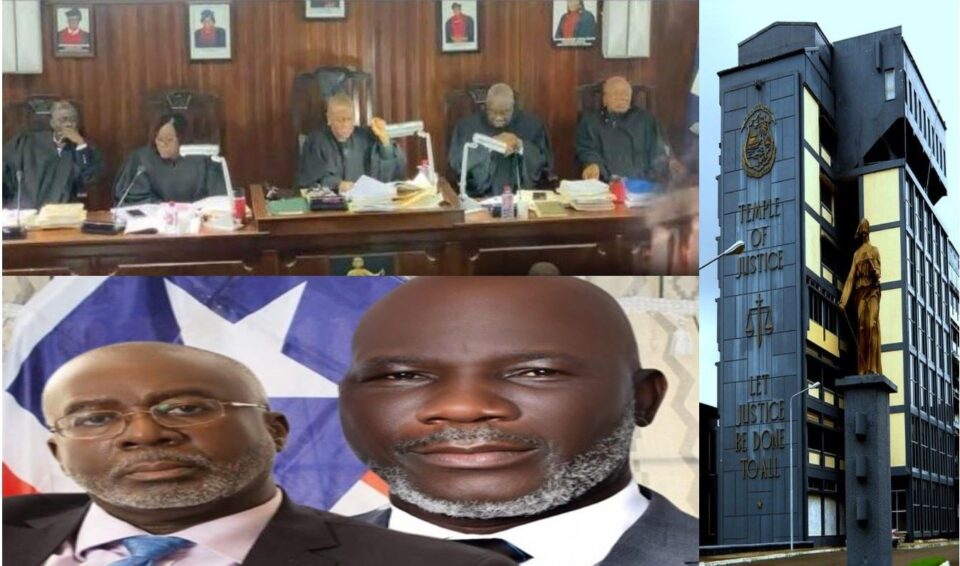Will The Pending April 23 Ruling Finally End The Long-Running Leadership Saga At The House?
By Garmah Never Lomo, garmahlomo@gmail.com
TEMPLE OF JUSTICE, Monrovia—Many see next Wednesday as D-Day the highly anticipated verdict from the Supreme Court of Liberia on the Bill of Information from embattled Speaker Cllr. Fonati Koffa challenging his recent removal from office by some of his colleagues known as “Majority bloc”.
The highest court in the land has announced that it will hand down its ruling in the case on April 23, 2025 saying where the law stands in this important case concerning the Pro and Anti Kofa groups into the Bill of Information, with the “Majority bloc” recognizing Montserrrado County District #11 Representative, Richard Nagbe Koon as Sppeaker.
The long awaited verdict, which is expected to be given at 11 Am next Wednesday, will determine who is the legitimate speaker or imposed speaker.
The both parties/ lawyers in the case have been notified about the date of the ruling.
All eyes in Liberia are set on the Supreme Court justices as to what will their ruling contain–whether or not the end the speakership confusion at the Legislature.
During arguments into the Bill of Information filed by the embattled Speaker J. Fonati Kofa on March 26,2025, Chief Justice Sie-A-Nyene G. Yuoh slammed the self-declared majority bloc in the House of Representatives, telling their lawyer, Cllr. H. Varney Sherman, that their numbers do not give them the authority to hijack legislative leadership or override due process.
“Even if your clients are 100 in number, they don’t have the right to impose themselves as the majority bloc,” Yuoh stated sharply during arguments on a Bill of Information filed by embattled House Speaker J. Fonati Koffa. The case challenges the legitimacy of a parallel legislative leadership allegedly installed by a group of lawmakers claiming to represent the majority.
“Though the Speaker is without a quorum, that doesn’t give you the right to declare yourselves as majority,” the Chief Justice emphasized. “Why did you go and designate another Speaker when the elected Speaker is still in office?”
Responding, Cllr. Sherman argued that while Speaker Koffa remained in his office, the group’s meetings and leadership decisions were held in the presence of the Deputy Speaker. But that explanation triggered more questions from the bench.
“Does the law say that a group of lawmakers can hold a session elsewhere while the elected Speaker is present and summoning them for session?” Chief Justice Yuoh asked pointedly.
Justice Yuoh also grilled Cllr. Arthur T. Johnson, lawyer for the minority bloc, pressing him to identify any specific violation of the Supreme Court’s December 6, 2024 ruling by the majority bloc. Cllr. Johnson maintained that the ongoing actions by the rival lawmakers — including conducting parallel sessions — defy the Court’s authority and ignore the fact that Koffa remains the legitimate Speaker.
Clarifying a key point, Chief Justice Yuoh noted that the Justice Minister and Attorney General of Liberia is legally empowered to interpret the Supreme Court’s rulings to the President — pushing back against criticism that the Justice Ministry had overstepped in interpreting the Court’s earlier decision concerning unconstitutional legislative actions.
“Where is the authority to stop the majority from doing what they’re doing?” she asked rhetorically, noting that the Legislature has yet to pass any law compelling lawmakers to attend a session called by one side or another.
The legal back-and-forth also spotlighted confusion over the purpose and scope of a Bill of Information. Under the Revised Rules of the Supreme Court, a Bill of Information is used to prevent a judge or any individual from executing the Court’s mandate improperly, or from interfering with its rulings.
Justice Jamesetta Howard Wolokolie reminded the lawyers that the Speaker has not been lawfully removed, underscoring the importance of respecting constitutional processes.
“Our rules are important to avoid chaos,” she said. “The Constitution gives lawmakers the authority to elect and remove a Speaker — but they must follow the proper procedure.”
Justice Yusuf Kaba weighed in with a cautionary note: “The Speaker must be accorded due process.” He pointed out that while parliamentary systems may allow a Speaker’s removal by a simple vote of no confidence, Liberia’s Constitution requires a two-thirds majority — and a clear, legal process — to remove a sitting Speaker.
“We understand that a majority elected another Speaker,” Kaba said. “But the law provides a procedure. Follow it.”
The Supreme Court has reserved ruling on the matter to a later date, leaving the leadership standoff in the Legislature unresolved — for now.

